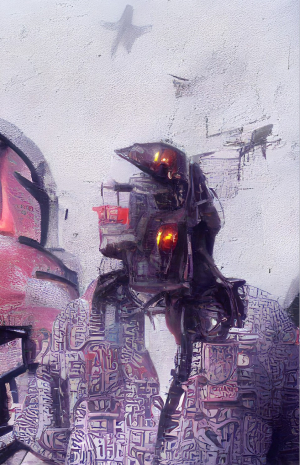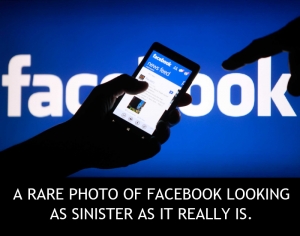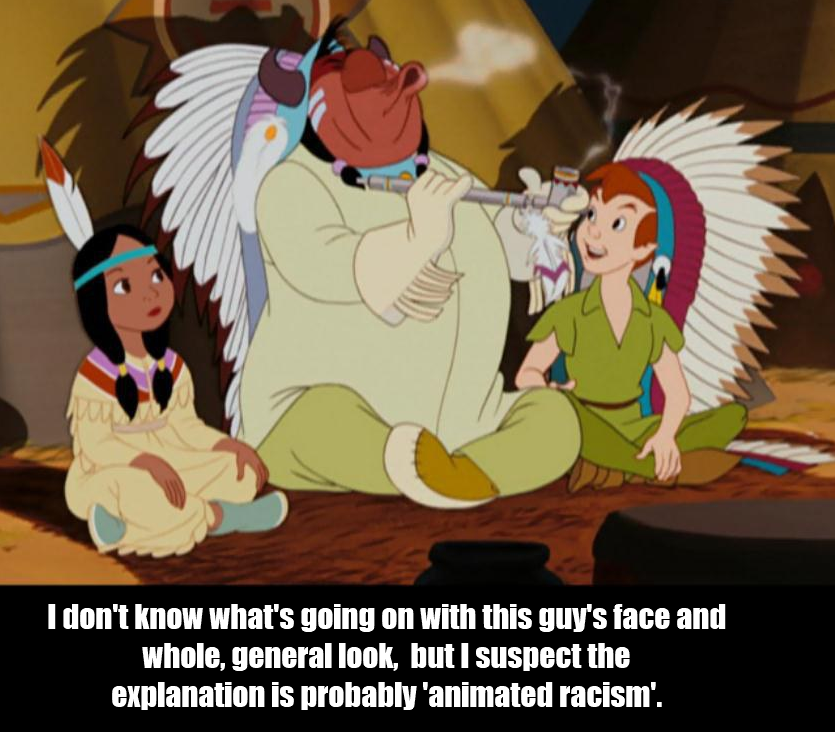
Aptly Named and Gloriously Bizarre: Review of Totally Fucking Disco
Paul V. Tims reviews Totally Fucking Disco, Fran Lock's new music and poetry album, made by Doc Ritchie at AVzounds and available to download and experience here. Image above: The Mall by Peter Kennard
Fran Lock occasionally styles herself as the Millwall FC of the poetry world: no one likes her, no one likes her, no one likes her, she don’t care. This, of course, is both a self-deprecating wee joke and a statement of intent. Fran Lock is not here to be liked. Fran Lock is here to do the kind of poetry that feels like a swift, rude awakening, courtesy of a kick in the skull.
This is not a criticism. However, while the ‘Millwall FC of the poetry world’ moniker might describe Lock’s intent and practice, it isn’t the most accurate description of her work. Lock’s oeuvre is more like what would happen if a copy of James Joyce’s collected works developed sentience, snorted a butt-load of bath salts and then submitted itself to editing by the two medieval monks who invented the bestiary. You know the ones I mean.
Again, this is not a criticism. Thus, when I learned that Lock was going to be putting out a quasi-spoken word album of poetry, half musicality and half traditional reading, all squeezed into a natty little MP3 format, I wasn’t wholly surprised. It was, arguably, the most Fran Lock move since submitting a poem about Sharknado to the National Poetry Competition and somehow placing third.
Being the intrepid action-journalist that I am (lol, no), I felt it incumbent on me to hunt down a copy of Totally Fucking Disco and bring it back from the murky depths of darkest Folkestone to be reviewed and examined with the academic rigour for which my part of the country is famous. By which I mean I emailed Fran and got her to send me a downloadable copy, about which I then had a vague reckon. Ladies and gentlemen, this is that reckon.
TFD kicks off with prototypical mid-Lockian zeal, opening on the evocative but narratively opaque Study for a head of Ulrike Meinhoff. Knowing that Ulrike Meinhoff was a German left-wing journalist and communist (sort of) who succeeded in blowing up quite a lot of things and who wrote an absolute banger of a manifesto does help to contextualise the poem to which her name is attached, but not as much as a novice in the field of Lockology might expect.
It’s always jarring and reliably brilliant
Rather, Study for a head seems to be a collection of musings on the criminalisation of ideology, the power of art (not exclusively poetry) to resist and the conditions that make resistance necessary. The opening line, “atrocious acts against reaction. check” might be read in one of three ways. It might be a condemnation of the brutality that the state and the status quo metes out whenever someone reacts with a reasonable degree of outrage to the unfair system. Alternatively, it might be suggesting that the reader use atrocious acts as a legitimate tool to pre-empt oppressive reaction. It might also be this same sentiment, but not Fran Lock’s sentiment, rather Ulrike Meinhoff’s.
Viewing a printed version of the poem doesn’t clear up the matter. Lock’s stoic refusal of the capital letter and all the newfangled linguistic hogwash that comes with it mean that the poem appears to pick up mid-sentence, rendering any interpretation as fragmentary as the text itself. This is, methinks, wholly deliberate.
Other phrases stand out, offering points of reference or simply arresting one’s attention, always jarring; reliably brilliant. “Machinery of thought: perverted and refined” is a fantastic turn of phrase that, conveniently, describes the way late-stage capitalism acts on the brain to curtail critical thinking and substitute pre-packaged opinions for authentic thought. Meinhoff was notably anti-capitalist, so this seems like a reasonable starting point for decoding the poem. Then, a few lines later, a pithy allusion to “photorealist porn” makes you (or at least me) laugh out loud, and we’re completely lost again. That’s alright. A Fran Lock poem is a lot like the city of Venice during Carnival. Obviously you’re going to get lost. That’s the point. Try to enjoy it.
Track 2, How and When the Body Collapses is more direct; easier to follow; driven by a more precise rage. At first, it looks like a simple meditation on the difference between the broad and the specific, as crystallised within the phrase “between sluggish cells and excited atoms. we are nourished and sickened from the same source”.
Certain early clues lead a reader to believe this is a poem about the tension between loving one’s land and hating one’s country; between the identification with nature and one’s neighbourhood (“that which surrounds and circulates”) and the disgust one feels for the cruel institution of England (“imposing its failed grace all over us”).
Then How and When delivers this suckerpunch of a line: “you can declare war on a country, but you do war on a people”. After this point, the purpose of the dichotomy between the general and the specific becomes clear. This poem is about the hatred of nations; of armies; of wars, weighed against the sympathy for their victims; their misguided citizens, the kids who get recruited into the military because they’re told over and over again that their lives are empty and without meaning. Because they’re poor, and the only worth the powers that be ever attribute to the poor is the value of their pre-dead bodies as cannon fodder.
It's about the class dynamics that make war possible
It’s appropriate that How and When contains such a pivotal, defining line because the poem itself is, arguably, the piece that defines the album or, at least, gives it its overriding themes. From How and When onwards, we know that Totally Fucking Disco is mainly concerned with England and war or, more precisely, the bigotries, hopelessness and class dynamics that make war possible and, for the elites, even desirable.
Some listeners might wonder why the collection starts with the more obscure Study, but that’s missing the point. Study and How and When are co-dependent pieces: they define the tension at the heart of the album. I don’t want to go through every single poem included in the compilation because it deserves to be encountered as fresh as possible. What makes Totally Fucking Disco, well, totally fucking disco, is its ability to surprise and I wouldn’t take that away from you.
However, I would like to note that the first two poems establish a tension that plays out through the whole album: specifically, a tension between the personal, recondite and interior on the one hand (Study) and the brutally, horrifyingly factual on the other (How and When). Yes, the album is concerned with cataloguing England (or, as Lock would have it later on, Angerlund) and its many small, petty atrocities, but it’s also concerned with the lens through which Lock and various fictive and half-real poetic voices encounter these myriad villainies.
Later poems on the album mesh and merge the two perspectives: that of the resolute reporter on terrible reality and that of the experiencer, so that one cannot be understood without the other. In fact, there is a hint that the way we experience reality can also be weaponised as a form of resistance.
For example, in Poem No. 3, A Banging Classic, there is a contempt to the way the speaker describes Angerlund as “a royalist pratfall paradigm”. Here is total negation of the untenable national value system. It’s not a moral abdication from it, but an active renouncement that positions the speaker – the experiencer – as something wilfully separate from the space they inhabit. Lock has spoken elsewhere about making oneself “indigestible” to capitalism and its internal logics. Here, she presents, perhaps, a methodology of making oneself similarly indigestible to Englishness.
It’s revolutionary
Okay. All this sounds revolutionary. And it is. But Fran Lock’s revolution is not the po-faced, monolithic, systemic overthrow of previous revolutions. It is intertextual, eclectic and, frankly hilarious. At one point, Benedict Cumberbatch’s name is cheerfully repurposed to mean, roughly, ‘a load of posh-boy tosh’. A line from the videogame Saints Row the Third is quoted to deflate national jingoism (to condense: when the character of ‘The Boss’ yells “Familiar with Agincourt, you prick?!”, it’s one thing. When some berk outside a Wetherspoons does it, it’s another).
There are references to Hancock’s Half-Hour, Archer and the Joker from Batman, sitting alongside allusions to T.S. Eliot: a great melange of humorous juxtaposition and pop-culture fluency that simultaneously elevates and mocks the material on which it draws. There is a slyness here: a cleverness that persuades, not by advertising itself, but by waiting to be discovered by the most attentive listeners.
The sheer breadth of references and the themes that they invoke also serve another purpose: they alter the album’s opacity to the listener. Bluntly put, those who affect disdain for the trivial, the fleeting, the ephemeral and the silly will have a much harder time understanding what is being said than those with the intellectual security to read both Chaucer and Grant Morrison.
There’s also a mutagenic quality to Totally Fucking Disco. In Public Lecture, for example, a direct comparison is drawn between the economic failings of the 1570s and those of today, which initially seems like a departure from the compilation’s previously established concerns. It isn’t. This is still about England/Angerlund and war, but now it is the war on the poor, perpetrated by market forces on a cyclical basis, that is being brought under the microscope.
The concerns of pre-modern agricultural workers and the concerns of the present-day labour force are the same. The conditions that ripened England for the English Revolution and Cromwell’s betrayal of Leveller ideals are the same conditions that the army recruiters of previous poems prey on to turn poverty-stricken human beings into meat for the grinder. I’m trying not to sound pretentious in this analysis, but we’re speaking about a poetry collection that collapses time itself, obliterating the distinction between the 21st Century and the decades just before Shakespeare.
Some pretentiousness on my part is, regrettably, inevitable. It is a testament to Lock’s talents that that same pretentiousness is never evident in the poems themselves. For several poems, the whole collection seems to slide backwards in history, so that by the time we get to the opening lines A Prophecy (“time’s up. Put away your dusty bunting, your breeks of cherished tweed”) it’s impossible to tell who is being addressed: the monarchist elites of the 1500s or the jingoists of today? In reality, I suspect, the answer is ‘both’ because the distinction is meaningless.
In point of fact, the past and the present both seem to be happening simultaneously in the final poem of the sequence, Totally Fucking Disco itself. I don’t wish to spoil it, because it’s one of my favourites, but let’s just say “tunics of retinue” and “anoraks of masturbation” both make showstopping appearances and leave it at that.
It may even change you!
But why did any of this need to be an album? Why not a book? Why not a conventional poetry collection? For one, the whole thing is set to music, courtesy of AVzounds. Sometimes it’s beating, marching, militarist music evoking both the demented nationalist fervour Lock is railing against and the drumbeat of fury she’s setting up against it. Other times it’s strange, wending ethereal music befitting the weird literary time-travel at work. Most of the time it’s both.
There are also sound effects: creaking ropes to match a mention of nooses; snatches of arguments and news broadcasts talking to themselves in the background; the odd blaring of an accordion jarring the listener to make them sit up and pay attention. There are even places (many places in fact), where Lock’s voice is distorted or echoing, adding to the desired sense of menace or disconnect. There’s a bit where the echoes and distortion are used in concert to blur the lines between three possible phrases: “we raise you”, “we raze you” and “we erase you”. Each changes the meaning of the poem in question in interesting ways and to present all possibilities simultaneously is something that can only be done in the audio format.
Totally Fucking Disco is a strange album; a profoundly and marvellously surreal experience. It will depress you in places. It will make you soar in others. It may even change you. It is an album that forces you to confront the hypocrisy of England and immerses you in the torrent of its culture, both native and borrowed. It doesn’t spare you any pain, but it doesn’t deny you any hope or humour. In this way, it is honest and in its honesty, it is liberating. It does exactly what it says on the tin. It is, simply, totally fucking disco.












